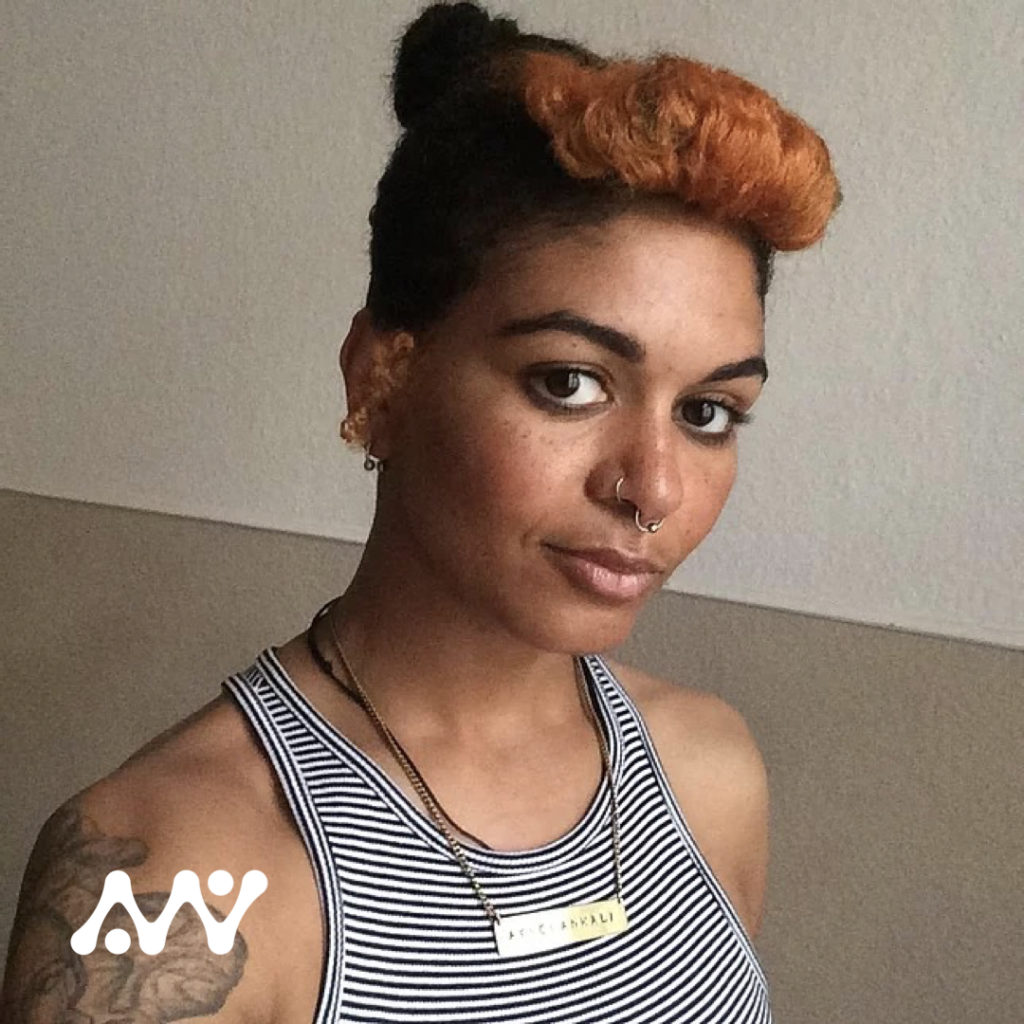#6
Community Accountability & SilenceSpeakers:
Camille Borton is an interdisciplinary artist, writer and educator, working on the intersections of social change, drug policy, anti-racism as well as transformative justice and brings a lot of expertise in facilitating community accountability processes. Camille Barton was trained in restorative justice and embodied peer counselling in the US and directs the Collective Liberation Project, which educates about forms of oppression such as racism and sexism and how they operate in a cultural context. Camille is the artistic director and main booker for Emergent Bass, an event series celebrating the Afro Diaspora influence in electronic music and underground club culture.
In their input, Camille talks about how embodiment can facilitate and help us with support and processes of community collaboration and accountability and asks how we can create safer spaces within a club that do not reproduce systems of oppression and discrimination.
Here you can listen to Camille’s Input.
Gizem Adiyaman is a Berlin born and raised DJ, party promoter, podcaster and political educator. In 2017, together with her best friend Lucia Luciano, she founded the event series and soundsystem Hoe_mies that focuses on female & LGBTQI artists, especially in Hip Hop. Adiyaman and Luciano are also the hosts of the podcast „Realitäter*innen“. They talk about the importance of providing a platform for marginalized identities to educate the mainstream about their realities and shed light on typically taboo topics like sex work, the prison system, homelessness, and more.
Gizem reports on experiences of »Cancel Campaigns» and public Call Outs that she experienced with her collective and podcast, how she dealt with them and what insights she took away from these processes. Gizem concludes by giving concrete instructions on what possibilities and steps there are to deal with a cancel campaign.
Here you can listen to Gizem’s Input.
Insights and Outlook
- The human nervous system is exposed to increased and constant stress under capitalist conditions, discriminatory structures and especially in the club context and possible drug influences. In conflict situations, this stress leads to a fight-or-flight response or a freeze response, so that in this dissociative state it becomes more difficult to hear other people. In these situations it is therefore important not to react immediately, but to pause and wait until there is capacity or space to deal with the conflict and the process that follows in a clear and more conscious state.
- The embodied and trauma-informed approach should be incorporated into the training of awareness teams and the development of guidelines for events, so that in cases of discrimination and conflict, there is not only an awareness of how to logistically deal with the situation, but also of what is happening in the nervous system of the person affected and in the nervous system of the person who caused the harm. It is important to understand that both the person affected and the person doing the act can dissociate and learn how we can navigate and support in these moments.
- In order to enable people who have caused harm to find a way back into the community, it is important on the one hand that they acknowledge what they have done and are ready and willing to work on themselves and actively go through the process. On the other hand, we live in a punitive state where we are not only used to, but even find pleasure in punishing offenders. Therefore, it is necessary that the community admits this pleasure and thus becomes open to find another way to transform systems of justice and to take responsibility together.
- In conflict situations, there are always more roles involved than just victim and perpetrator, such as bystander and witness. For community accountability processes it is important to break down these binaries and to realise that roles are fluid and can change depending on the context.
- One way to ensure accountable community accountability processes is to create transparent communication processes. We need more sustainable tools and practices than toxic blaming and “cancel cultures” in social media to carry out and support accountability processes, as well as external support and funding for training in harm reduction and development of structures and resources within our clubs.
Speakers:
Camille Borton is an interdisciplinary artist, writer and educator, working on the intersections of social change, drug policy, anti-racism as well as transformative justice and brings a lot of expertise in facilitating community accountability processes. Camille Barton was trained in restorative justice and embodied peer counselling in the US and directs the Collective Liberation Project, which educates about forms of oppression such as racism and sexism and how they operate in a cultural context. Camille is the artistic director and main booker for Emergent Bass, an event series celebrating the Afro Diaspora influence in electronic music and underground club culture.
In their input, Camille talks about how embodiment can facilitate and help us with support and processes of community collaboration and accountability and asks how we can create safer spaces within a club that do not reproduce systems of oppression and discrimination.
Here you can listen to Camille’s Input.
Gizem Adiyaman is a Berlin born and raised DJ, party promoter, podcaster and political educator. In 2017, together with her best friend Lucia Luciano, she founded the event series and soundsystem Hoe_mies that focuses on female & LGBTQI artists, especially in Hip Hop. Adiyaman and Luciano are also the hosts of the podcast „Realitäter*innen“. They talk about the importance of providing a platform for marginalized identities to educate the mainstream about their realities and shed light on typically taboo topics like sex work, the prison system, homelessness, and more.
Gizem reports on experiences of »Cancel Campaigns» and public Call Outs that she experienced with her collective and podcast, how she dealt with them and what insights she took away from these processes. Gizem concludes by giving concrete instructions on what possibilities and steps there are to deal with a cancel campaign.
Here you can listen to Gizem’s Input.
Insights and Outlook
- The human nervous system is exposed to increased and constant stress under capitalist conditions, discriminatory structures and especially in the club context and possible drug influences. In conflict situations, this stress leads to a fight-or-flight response or a freeze response, so that in this dissociative state it becomes more difficult to hear other people. In these situations it is therefore important not to react immediately, but to pause and wait until there is capacity or space to deal with the conflict and the process that follows in a clear and more conscious state.
- The embodied and trauma-informed approach should be incorporated into the training of awareness teams and the development of guidelines for events, so that in cases of discrimination and conflict, there is not only an awareness of how to logistically deal with the situation, but also of what is happening in the nervous system of the person affected and in the nervous system of the person who caused the harm. It is important to understand that both the person affected and the person doing the act can dissociate and learn how we can navigate and support in these moments.
- In order to enable people who have caused harm to find a way back into the community, it is important on the one hand that they acknowledge what they have done and are ready and willing to work on themselves and actively go through the process. On the other hand, we live in a punitive state where we are not only used to, but even find pleasure in punishing offenders. Therefore, it is necessary that the community admits this pleasure and thus becomes open to find another way to transform systems of justice and to take responsibility together.
- In conflict situations, there are always more roles involved than just victim and perpetrator, such as bystander and witness. For community accountability processes it is important to break down these binaries and to realise that roles are fluid and can change depending on the context.
- One way to ensure accountable community accountability processes is to create transparent communication processes. We need more sustainable tools and practices than toxic blaming and “cancel cultures” in social media to carry out and support accountability processes, as well as external support and funding for training in harm reduction and development of structures and resources within our clubs.

